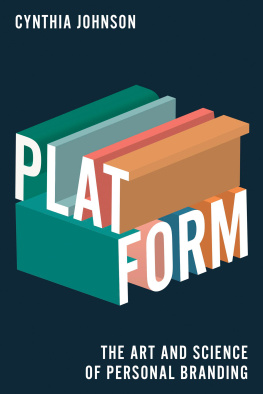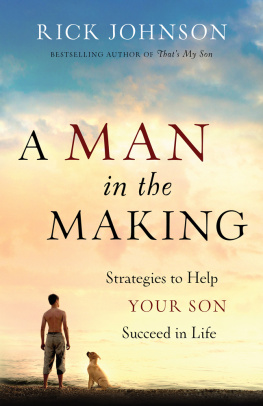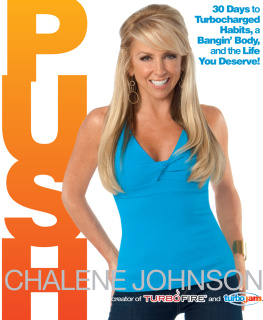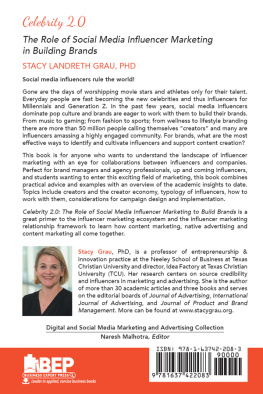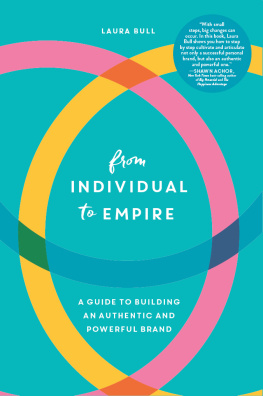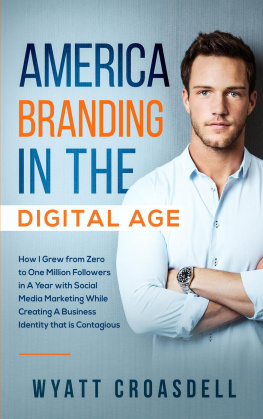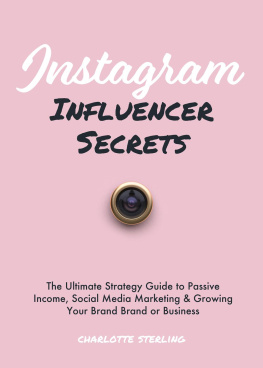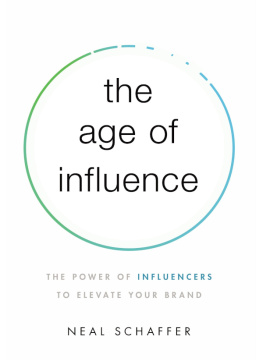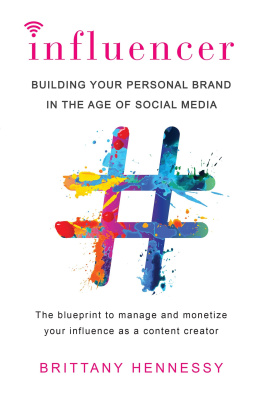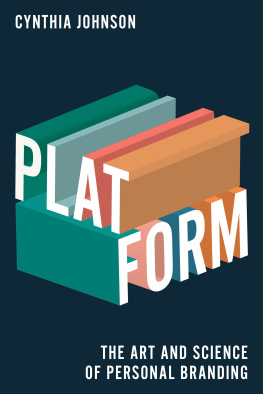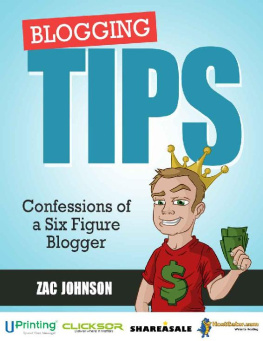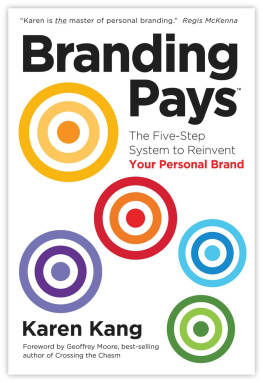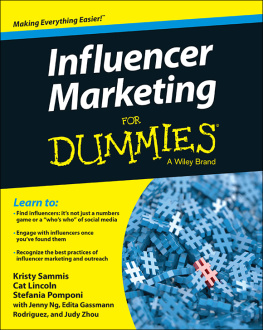ACKNOWLEDGMENTS
Building a platform and writing a book require considerable patience, support, and love from the people in your life. I would like to thank all of those who have encouraged me and believed in me: my grandparents (Thomas and Margaret Pacchioli) for being daring; my parents (Margaret and Paul Cadena) for pushing us to be freethinkers; my siblings (Sarah Johnson, Patrick Johnson, Lindsey Johnson, Kayse Cadena, and JP Cadena) for always having my back; my mentors (Abhilash Patel, Mark Goulston, Yael Swerdlow, and Paula Woods) for helping me overcome many hurdles; my best friends (Ashley Legg and Megan McNichol) for always being a phone call away; and my growth-hacking friends (Ben Landis and Aidan Cole) for teaching me their tricks.
I thank my business partner, friend, and bridesman (Zach Binder) for being the best partner anyone could ask for and for always being there to pick up my slack and my head when I need him to, and a special Thank you to our team at Bell + Ivy for all their talent, hard work, and continued support, because without them none of this would have been possible.
I thank my fianc and best friend, Thomas Pancoast, for being my partner in crime, my editor, a great dog-dad to our Poe, and my biggest cheerleader in life.
To the many people who have followed me and listened as my platform was growing: you are the reason all this is possible. Thank you for supporting me.
ABOUT THE AUTHOR

CYNTHIA JOHNSON is the cofounder of the Los Angelesbased branding agency Bell + Ivy and has 1.7 million followers on Twitter (@CynthiaLive). She was named one of the top five personal branding experts in 2017 by Entrepreneur magazine, Inc. listed her as one of the 20 digital marketing people to follow, and Mashable named her the third most important marketer to follow on SnapChat (#CyninLA). Johnson sits on the advisory board for The Millennium Alliance, a leading technology, business, and educational advisory firm serving Fortune 1000 C-Level executives. Cynthia is a global keynote speaker and has addressed companies and events such as Alibaba in China, World Government Summit in Dubai, and Global Ventures Summit in Indonesia and Mexico, as well as USCs Marshall School of Business and Stanfords Igniter program. Her work has been featured in Inc., Forbes, and TIME and she has advised on the social media, branding, and viral campaigns for companies such as Vans, Levis, and the Susan B. Komen Foundation. Visit cynthialive.com.
EPILOGUE
YOUR PERSONAL BRAND NEEDS A GROWTH STRATEGY
Lets say you have already reached the place where you have a brand message, a website, media, your own byline; you are speaking at events, and your social media is on its way. You are the top person to call when someone needs a wealth manager, a real-estate agent, a doctor, a life coach, a commercial actor, or whatever you are. Congratulations!but now what? Thats right: whats next? You cant keep doing the same thing over and over. You will get bored, the world will change, and so will your audience.
Think about what happens when child actors grow up, and their audiences grow up, too. When I was young, I was obsessed with Lance Bass from NSYNC. I watched all of the bands videos and bought all of their CDs (yes, CDs). Now that Ive grown up, the only NSYNC member who has remained relevant is Justin Timberlake. He got into tech investing with Myspace, he started acting and producing, he had a solo music career, and he kept on changing. He changed his appearance, his message, and the way he delivered his message. Miley Cyrus is another great example: she went from country to outrageous overnight. That was the right next move for her personal brand to make. Were people concerned? Yes. Were they upset? Yes. Did they get over it? Of course they did.
When you are ready to grow your brand, evolve, and move on to the next thing, it is crucial that you do it all at once. If you try to gradually implement change for your brand, you will create confusion and inconsistency. You have to plan the change and then make it happen quickly. Go back to the drawing board, and think about where you are now and where you want to go. Create a new brand statement, a new look for your website, and updated bios that emphasize the new you. When you are all preparedboom! You change everything in a day. Just like that, you flip a switch. People will definitely noticethey always doand they will have opinions about your new image. But you have to trust your gut and remember that you are not living for anyone elses amusement. The reason you need to make such a fast transition is to avoid confusion.
Get out of your safety bubble. There are people who have no idea who you are. The longer you sit in the small world of influence you have created around yourself, the more out of touch you will become. Dont hang on to that job you quit four years ago. Dont speak at the same conferences every year on the same topics. Change it up. Every industry changes, even yours. If you keep speaking as a topic expert about something that you and your industry have outgrown, you are no better than the political pundits who have no real experience in politics.
Dont sit back and watch less-experienced people take your seat at the table. If you are more experienced, more knowledgeable, and more qualified, then you wont have to compete for a seat at the table. But you will have to ask for one. Dont practice humility so much that you become prideful in your humility. The world needs more real experts to be heard so that fewer fake experts can be heard.
When you settle into that new area of expertise, it will be a shock to your system, because you will realize that not everyone knows who you are. Some of the people are new, the conversation has shifted, and you find yourself feeling as if you are starting over. You will want to run back to that safe place, but dont do it. If you have a preexisting brand, pivoting to grow your brand and your reach is not starting over: it is expanding your network. Before you know it, the question you will hear most often is, What do you do now? People will always ask that question whenever they see someone who has multiple exemplary career paths.
NOTES
Chapter One
.
.
.
.
.
Chapter Two
.
Chapter Three
.
Chapter Six
.
Gordon W. Allport and Leo Postman. The Psychology of Rumor, Henry Holt and Company (New York, NY: 1947).
.
.
.
.
.
Chapter Seven
.
.
.
.
.
Chapter Ten
.
.
.
THE CASE FOR PERSONAL BRANDING
Many people believe that personal branding is a negative or selfish thing to do. There is a misconception that personal branding is about branding, packaging, and selling. This is not what personal branding is at all. Personal branding is self-awareness and self-preservation. I think of it as credit. You are not your credit score, but when you go to buy a house, your credit score will have a huge impact on your chances of being approved for a loan and what sort of interest you will pay. Your credit only matters when it comes into question for certain approvals.
Just as with credit, your personal brand comes into question only when someone is trying to approve your participation in something (a job, an event, or the like). And as with credit, having no personal brand can be just as damaging as having a bad one. The difference between your personal brand and your credit score is that you know when someone is looking to validate your credit score and you probably already know what they are expecting and going to see. With personal brands, most people have no idea when someone is looking for them online, what they hope to see, or what they will find. We give more attention to our credit scores than to our reputations.

